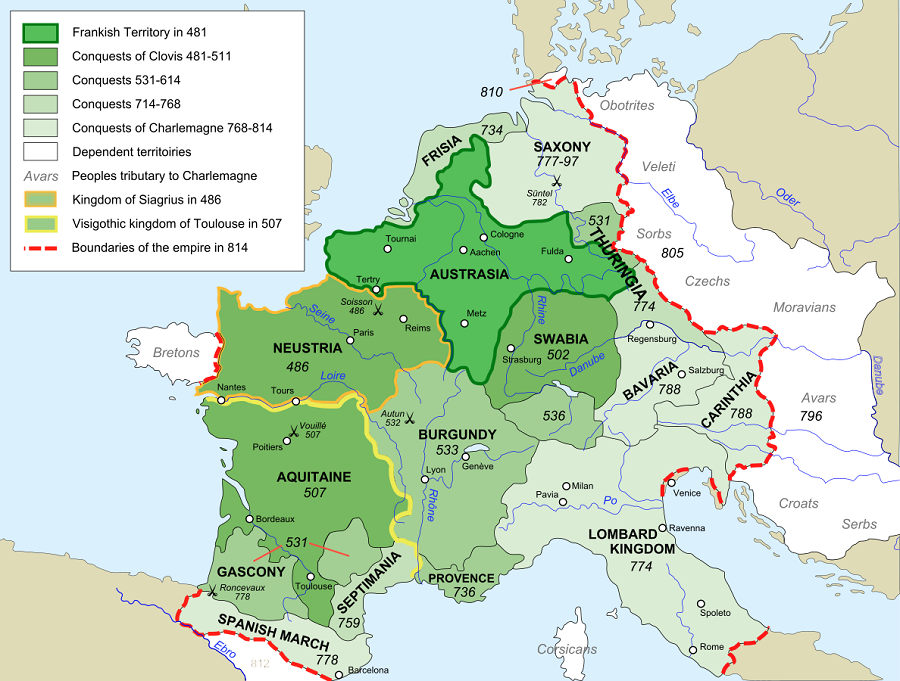The Song of Roland, a real Homeric poem in its great beauty, and yet rude and simple as became its national character, bears witness to the prolonged importance attained in Europe by this incident in the history of Charlemagne.
Continuing Charlemagne,
our selection from A Popular History of France from the EarliestTimes, Volume 1 by François P.G. Guizot published in 1869. For works benefiting from the latest research see the “More information” section at the bottom of these pages. The selection is presented in fourteen easy 5 minute installments.
Previously in Charlemagne.
Time: 778
Place: Spanish March

CC BY-SA 3.0 image from Wikipedia
The aggressive campaign was an easy and a brilliant one. Charles with his army entered Spain by the valley of Roncesvalles without encountering any obstacle. On his arrival before Pampeluna the Arab governor surrendered the place to him, and Charlemagne pushed forward vigorously to Saragossa. But there fortune changed. The presence of foreigners and Christians on the soil of Spain caused a suspension of interior quarrels among the Arabs, who rose in mass, at all points, to succor Saragossa. The besieged defended themselves with obstinacy; there was more scarcity of provisions among the besiegers than inside the place; sickness broke out among them; they were incessantly harassed from without; and rumors of a fresh rising among the Saxons reached Charlemagne. The Arabs demanded negotiation. To decide the King of the Franks upon an abandonment of the siege, they offered him “an immense quantity of gold,” say the chroniclers, hostages, and promises of homage and fidelity. Appearances had been saved; Charlemagne could say, and even perhaps believe, that he had pushed his conquests as far as the Ebro; he decided on retreat, and all the army was set in motion to recross the Pyrenees. On arriving before Pampeluna Charlemagne had its walls completely razed to the ground, “in order that,” as he said, “that city might not be able to revolt.” The troops entered those same passes of Roncesvalles which they had traversed without obstacle a few weeks before; and the advance-guard and the main body of the army were already clear of them. The account of what happened shall be given in the words of Eginhard, the only contemporary historian whose account, free from all exaggeration, can be considered authentic. “The King,” he says, “brought back his army without experiencing any loss, save that at the summit of the Pyrenees he suffered somewhat from the perfidy of the Vascons (Basques). While the army of the Franks, embarrassed in a narrow defile, was forced by the nature of the ground to advance in one long close line, the Basques, who were in ambush on the crest of the mountain — for the thickness of the forest with which these parts are covered is favorable to ambuscade — descend and fall suddenly on the baggage-train and on the troops of the rear-guard, whose duty it was to cover all in their front, and precipitate them to the bottom of the valley. There took place a fight in which the Franks were killed to a man. The Basques, after having plundered the baggage-train, profited by the night which had come on to disperse rapidly. They owed all their success in this engagement to the lightness of their equipment and to the nature of the spot where the action took place; the Franks, on the contrary, being heavily armed and in an unfavorable position, struggled against too many disadvantages. Eginhard, master of the household of the King; Anselm, count of the palace; and Roland, prefect of the marches of Brittany, fell in this engagement. There were no means, at the time, of taking revenge for this check; for, after their sudden attack, the enemy dispersed to such good purpose that there was no gaining any trace of the direction in which they should be sought for.”
History says no more; but in the poetry of the people there is a longer and a more faithful memory than in the court of kings. The disaster of Roncesvalles and the heroism of the warriors who perished there, became in France the object of popular sympathy and the favorite topic for the exercise of the popular fancy. The Song of Roland, a real Homeric poem in its great beauty, and yet rude and simple as became its national character, bears witness to the prolonged importance attained in Europe by this incident in the history of Charlemagne. Four centuries later the comrades of William the Conqueror, marching to battle at Hastings for the possession of England, struck up The Song of Roland, “to prepare themselves for victory or death,” says M. Vitel in his vivid estimate and able translation of this poetical monument of the manners and first impulses toward chivalry of the Middle Ages. There is no determining how far history must be made to participate in these reminiscences of national feeling; but, assuredly, the figures of Roland and Oliver, and Archbishop Turpin, and the pious, unsophisticated, and tender character of their heroism are not pure fables invented by the fancy of a poet or the credulity of a monk. If the accuracy of historical narrative must not be looked for in them, their moral truth must be recognized in their portrayal of a people and an age.
| <—Previous | Master List | Next—> |
More information here and here, and below.
 |
We want to take this site to the next level but we need money to do that. Please contribute directly by signing up at https://www.patreon.com/history
Leave a Reply
You must be logged in to post a comment.